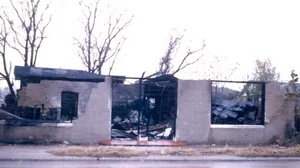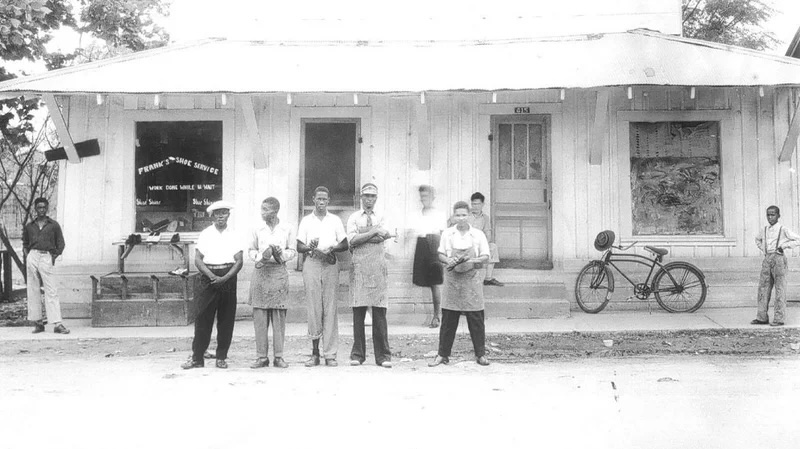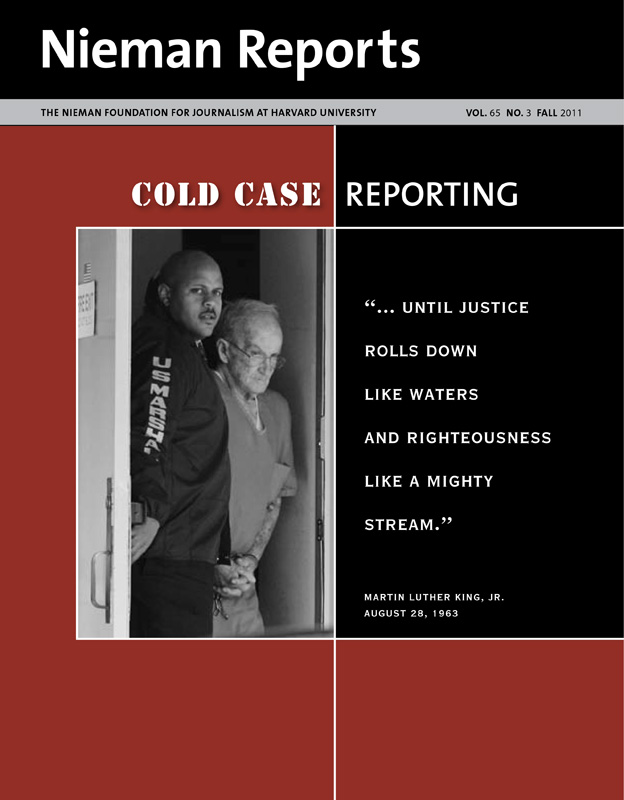I was 9 years old in December 1964 when Frank Morris, a 51-year-old African-American businessman, was murdered in Ferriday, Louisiana. Although I lived nearby, I had never heard of Morris until late February 2007 when the Federal Bureau of Investigation (FBI) announced it would take another look at more than 100 unsolved civil rights era murders, including that of Morris.
Today I am the editor of the weekly Concordia Sentinel in Ferriday. Two hours after learning of the murder, I wrote my first story. Morris died four days after the Ku Klux Klan torched his business. He had been asleep in the back of his shoe shop when he heard glass breaking shortly after midnight on December 10, 1964. Out front he saw two men, one pouring gasoline on the outside of the building, the other holding a shotgun. Morris yelled, "Hey, stop that!" Suddenly, the building was ignited, and Morris was in a sea of flame and smoke. The man with the shotgun blocked his escape through the front door as he pointed the barrel at Morris while shouting, "Get back in there, nigger!"
The more I learned about his murder, the more outraged I became. Ferriday was a poor town and families were lucky to provide father, mother and child with just one pair of shoes each. Morris made those shoes last. Everyone relied on him.
Two police officers arrived just seconds after Morris's attackers fled. They watched Morris emerge from the back of the building completely in flames—naked, bleeding, exhausted—leaving behind a trail of bloody footprints. Skin peeled and fell from his body. Morris's hair was ablaze, the waistband of his boxer shorts and the shoulder straps of his undershirt smoldering. Morris said he didn't know his attackers.
The FBI agent who rushed to the hospital within hours of the arson said, "If Frank would have told me who they [his attackers] were, we would have gone after the sons of bitches." Morris's friends believed he knew his attackers but was afraid to identify them.
Dredging the Past

After my first story appeared, his granddaughter, Rosa Williams, called. In 1964, she was 12 years old and living with her aunt in Ferriday. Then in her mid-50's, she called me from Las Vegas. "Thank you," she said, letting me know she had learned more about her grandfather's death from one Sentinel article than she had during the past four decades. No one had ever talked to her about the murder. For years she had prayed for justice.
I could hear the pain of that 12-year-old girl in her voice and it reminded me of the time in high school when I witnessed the death of a young family in a fiery automobile accident. Thinking about Morris, I wondered how in God's name one human could purposely set another on fire. What was going through Morris's mind when he faced his attackers? What led those men to Morris's shop?
The owners of the Concordia Sentinel never hesitated in following the story. We knew some would be angered to read about the parish's ugly racial past. Some canceled subscriptions. We were threatened. Our office was burglarized. One irate reader called to find out my ultimate goal. "To solve a murder," I said.
"You can't do that," she snapped. "You're just a reporter!"
She hung up. We pressed on.
With a newsroom of three (including me), I knew I needed help. I needed FBI files and I had to find people who had left Ferriday decades ago. I had to move quickly. One key suspect in Morris's murder died months after the FBI reopened the case in 2007. Most suspects and witnesses were elderly or dead.
RELATED ARTICLE
“When Lawyers and Journalists Share Common Cause”
– Paula C. Johnson and Janis L. McDonald
Help initially came from Janis L. McDonald and Paula C. Johnson, founders of the Syracuse University College of Law Cold Case Justice Initiative. In subsequent years, journalism student interns from Louisiana State University, the University of North Carolina, and the University of Alabama have searched through documents in courthouses throughout Louisiana and Mississippi, retrieved records from the National Archives, and followed leads. The Civil Rights Cold Case Project, based at the Center for Investigative Reporting in Berkeley, California, gives me the welcomed opportunity to pursue my reporting in the supportive company of other journalists who are dealing with similar cases.
Retired FBI agents and police officers are crucial to my reporting. At first I tried to contact every officer who worked in Concordia Parish during the 1960's, '70's and '80's. Old men now, many remain furious about what happened to Morris.
I have interviewed hundreds of people in some unusual places—in cornfields, cemeteries and nursing homes. Daughters and sons of Klansmen contact me, as do victims of racial violence and elderly women who recount their experiences during those racially turbulent days. One widow whose husband was almost killed by Klansmen told me she still lives in fear. One reader wrote: "If all of the wicked, hate crimes could be taken out of the secret places and stand in the light, this country could be healed!"
In the past four years, I have written more than 150 stories about the Morris killing. The most significant one was published in January when the Sentinel reported that a 71-year-old Rayville, Louisiana man was involved in the arson, according to relatives, who also said that no one was supposed to be there that night; the perpetrators were shocked to see Morris. The man—Arthur Leonard Spencer—acknowledged in the summer of 2010 that he had been in the Klan in the 1960's but denied involvement in Morris's murder. His son, ex-wife and ex-brother-in-law, a former Concordia Parish deputy, contend that he is lying.
We were ready to run the story in November 2010 and asked the FBI for a comment. The bureau said if we published the story the case would be jeopardized and asked us to hold it indefinitely. When we decided otherwise, a spokesman from the U.S. Department of Justice (DOJ) told us that "justice will not be served" if the story ran in December. We went with the story in early January.
Grand Jury's Challenge
A month later the DOJ and the local district attorney convened a grand jury in Concordia Parish to look into this murder. Central to the case is a dead man—Frank DeLaughter, a deputy sheriff in 1964 who was the most feared man in the parish. At 6 feet, 4 inches and 250-plus pounds, DeLaughter was a Klansman and a suspect in many crimes. He was convicted in the 1970's in federal court of police brutality. DeLaughter once said he thought no more of killing a man than a rabbit.
He hated Negroes and was determined to see that they did not vote, integrate or achieve. The Klan had accused Morris of flirting with white women and of allowing interracial liaisons in the back room of his shop. Although Morris had served the black and white communities for three decades, he had always been by necessity sensitive to the racial standards of the day. He provided white women with curbside service so they would not have to walk inside his store.
Just the suggestion that a black man was involved with a white woman was trouble in 1964. But, according to FBI informants, when Morris stood up to DeLaughter and refused to repair his cowboy boots for free, the deputy became enraged. This confrontation triggered the arson.
The local Klan asked an outside Klan unit to beat Morris for allegedly flirting with white women. But DeLaughter wanted his shop torched and Morris's lifetime of work reduced to rubble. A Klan team of arsonists left the charred, smoldering ruins of the shoe shop as a message to Negroes about the price of crossing a white man.
For Morris's granddaughter, what happened on that December night remains a painful symbol of injustice yet to be rectified.
Stanley Nelson is editor of the Concordia Sentinel in Ferriday, Louisiana. For his work on the Frank Morris case, he was a finalist for the 2011 Pulitzer Prize for Local Reporting and a recipient this year of the University of Oregon's Payne Award for Ethics in Journalism and the Louisiana State University Manship School Courage and Justice Award.




